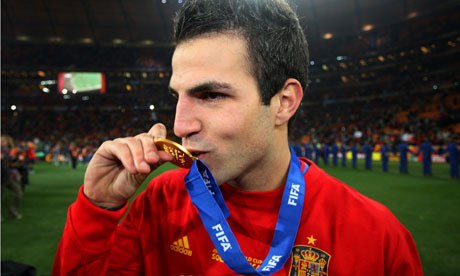World Cup 2010: Masterful Spain must now learn how to win emphatically
Opponents must prepare for years in fruitless pursuit of a Spain side who have become the most intimidating team of all

Spain are the most intimidating side of all. They may count on artistic and sometimes slight figures, but the new World champions threw their opponents into panic merely by taking the field. A beaten Holland would have been far more at ease had they been facing a contest of crunching physicality, but instead they were in terror of being embarrassed when the exhibition of rhythmic passing and movement got under way.
They must now rue their lack of nerve. Indeed, it is all but inconceivable that the manager Bert van Marwijk did not tell them to stay calm, concentrate on defending and be patient since the balance of the contest would shift at some stage or other. The Dutch ought to have been drawing on a belief in themselves since they arrived on an unbeaten run of 25 games.
The side, as it was, evidently could not block out the realisation that Spain, on such a night, embodied a different order of challenge to anything that had gone before. They undermined themselves with an apprehensiveness that made them strike out in anxiety. When the Holland manager was not blaming the English referee Howard Webb, he revealed the truth while speaking of the attempt to harass Spain.
It was unfortunate for Webb to receive the supreme honour for an official and then discover that he is being asked to regulate mayhem. It is too easy to say he ought simply to apply the laws of the game. In practice, he was seeking to save the honour of the final and he would have been accused of a lack of expertise had he dismissed one of the Dutch players early in the match.
There may have been just one occasion when he took tolerance to unacceptable extremes. When Nigel de Jong challenged by putting his studs into Xabi Alonso's chest, the reckless endangerment merited dismissal rather than a yellow card. The match had not reached the half-hour mark and Webb shied away from carrying out his duty. With the exception of that incident, the official deserves only sympathy.
Neither he nor anyone else anticipated the panic that would drive Holland to extremes. The profound indiscipline culminated in John Heitinga's dismissal after a second yellow card 19 minutes into extra-time. The substitute Cesc Fábregas then freed Andrés Iniesta to score the only goal seven minutes later. By then, Holland were enraged by any lapse in officiating, such as the award of a goal-kick instead of a corner, but they had set the anarchic tone.
It stemmed from a natural and legitimate impulse to disrupt Spain. Holland will have realised that they are not at the same level of expertise as Vicente del Bosque's side yet it would have been insufferable to go meekly to defeat. Germany were submissive in the semi-final and were too close to turning themselves into an honour guard as Spain made their stately way to the final.
Joachim Löw's players had that peculiar attitude because the young line-up had tacitly come to view this World Cup as preparation for glory in the next. Holland's frame of mind was in complete contrast. After defeat in the finals of 1974 and 1978, they were desperate to seize the prize by any means. Prior to Sunday's debacle, there had been rebukes in the Netherlands from those who saw the heritage of football ideals being rejected.
The current generation undermined itself because there are artful players in its midst who can get the better of defences. Despite their inferiority, Holland were twice through on goal, with Iker Casillas thwarting Arjen Robben each time. Those, in essence, were isolated moments. There was no grand strategy to beat the reigning European champions, just a will to make life uncomfortable for them and see what came of it.
For all the fouls, the Dutch outlook was timid. Their downfall would have been utterly sure were it not for Spain's quirkiness. This is now an indubitably great squad, but it possesses idiosyncrasies and so differs from the renowned teams in the history of other countries. It has appalling trouble in converting mastery into emphatic victory and all four fixtures in the knockout phase of the World Cup were won 1-0, just as the Euro 2008 final was.
Spain are well-served in defence and their midfield is assuredly entrancing but the attack is limited, especially when Fernando Torres's fitness and form are so restricted after injury that he was only used as a late substitute. Few sides can prosper in such circumstances, yet Spain have won a World Cup final at the first attempt. With both major prizes in their possession, it might look as if fulfilment has been attained and all that remains is for the squad to make the transition to becoming a national treasure.
The achievement is misleading, though, when it leads to the sense of a conclusion to the story. Spain's starting line-up had just two men in their 30s. At 32, Carles Puyol is the true greybeard, but he is a centre-back and should still be in shape for their defence of the European Championship two years from now. Xavi turned 30 in January and there are no indications at all of obsolescence. In any case, Del Bosque has Fábregas at his disposal, who would already be at the core of virtually any other national team.
Opponents must steel themselves for even more years in fruitless pursuit of a ball that is the personal property of triumphant Spain.

No hay comentarios:
Publicar un comentario